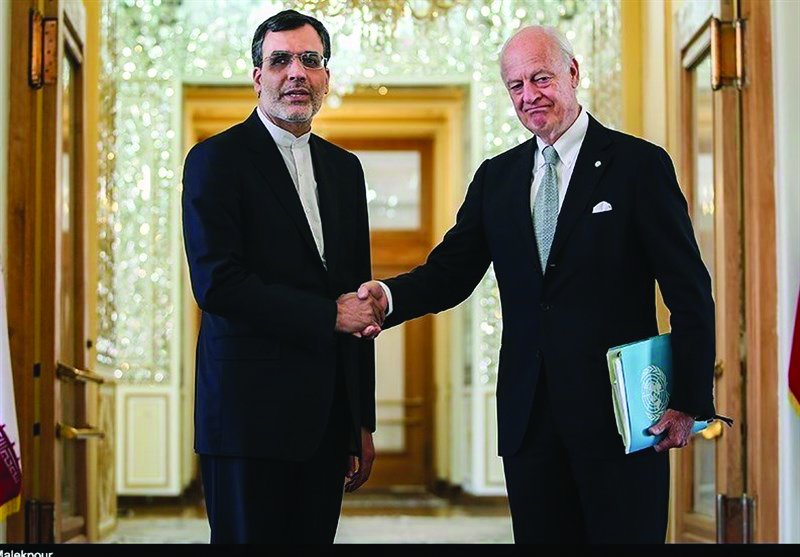UN Syria envoy holds talks in Tehran

TEHRAN – As the Syrian Army is tightening the noose around militants in Aleppo, United Nations Special Envoy for Syria Staffan de Mistura was in Tehran, exchanging views on the latest developments in Syria.
De Mistura’s meetings with Iranian Foreign Minister Mohammad Javad Zarif and Deputy Foreign Minister for Arab and African Affairs Hossein Jaberi Ansari were closed behind closed doors. On agenda should have been, inter alia, the incoming peace talks on the five-year-long conflict.
Previous rounds of negotiations produced no tangible results but some shaky hour-length truces in the war-torn country.
Failure of the UN-brokered peace talks has been linked to both regional and international differences over the future of President Bashar al-Assad.
Internationally, the U.S. and Russia have failed to come up with a clear-cut agreement, though during the recent Moscow visit, U.S. Secretary of States John Kerry shared with Russians a document for the formation of the Joint Implementation Group (JIG).
The purpose of the JIG, as stipulated in the text, “is to enable expanded coordination between the United States and the Russian Federation beyond the established safety of flight procedures.”
It will be not be clear, however, whether the incoming peace talks will be influenced by the JIG discussion which pave the way for more synchronized efforts against Daesh in Syria.
Additionally, the two are at loggerheads over the fate President Assad. The U.S. has insisted on an “Assad-Must-Go” policy without guaranteeing a bright post-Assad future for the Syrian people.
The situation is no better at the regional level. Iran and Saudi Arabia, as two Middle East powerhouses, each back opposing sides in Syria.
Tehran has insisted that the Syrian crisis can only be stopped through diplomacy, a stance which Riyadh has resisted to accept.
In a recent interview in July in Washington, Saudi Arabia Foreign Minister al-Jubeir said "Anything that can be done to bring the Russians into the fight against Daesh in an effective way is something that I think people would welcome.”
However, al-Jubeir said, “It cannot be at the cost of keeping Bashar al-Assad in power and it cannot be with the Russians continuing to attack the moderate Syrian opposition.”
But, positive signals are emerging. Recently, Turkish officials have referred to a more friendly regional policies, which some analysts have interpreted as a more flexible stance on Syria.
Particularly, a thaw in Turkey-Russia ties after a one-year hiatus can make a big difference. How far this speculation can come true will depend much on what will be going on during President Erdogan’s visit to Moscow on August 9.
Amid these divergences and hopes for convergence, it is the Syrian people who are taking the brunt of the war.
The sooner the better, that’s what the people have in their minds while watching the peace talks with bated breath.
AK/PA
Leave a Comment